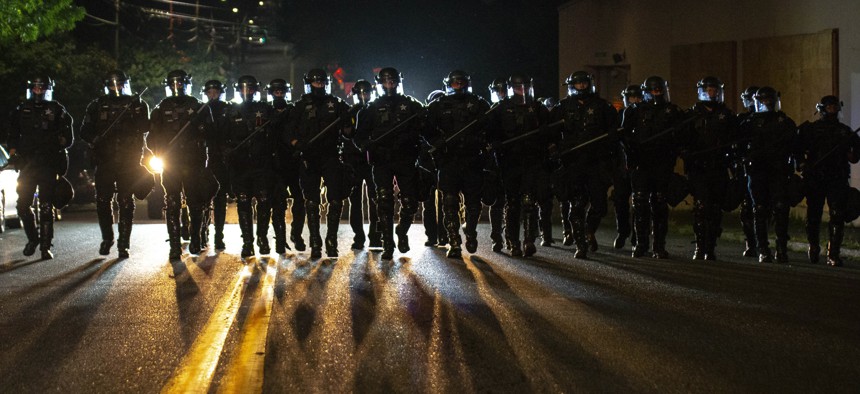Legal Experts Say Trump’s Push to Defund ‘Anarchist’ Cities Would Face Difficulty in Court

Portland police officers walk through the Laurelhurst neighborhood after dispersing a protest of about 200 people from in front of the Multnomah County Sheriff's Office early in the morning on Saturday, Aug. 8, 2020 in Portland, Ore. AP Photo/Nathan Howard
The president lost several legal battles in attempting to enforce a previous order to restrict so-called “sanctuary cities” from receiving federal grants.
President Trump ordered federal officials this week to review grants appropriated to several Democrat-controlled cities, citing the desire to cut off funding for “anarchist jurisdictions” where protests against police brutality have been ongoing for months.
But much like the president’s prior order about so-called “sanctuary cities,” which sought to restrict grant funding for jurisdictions that did not cooperate with federal immigration officials, legal scholars say Trump’s latest memorandum would be difficult to defend in court.
Congress has the power to authorize spending, not the executive branch, so the administration would have to identify very broad discretionary language that would allow it to restrict specific grant funding, said Steven Schwinn, a law professor at the University of Illinois, Chicago and co-editor of the Constitutional Law Prof Blog.
“Congress gets to set the terms of federal funding,” Schwinn said. “[Trump] lacks authority to do it.”
The memo gives the Justice Department 14 days to identify “anarchist jurisdictions” where officials have “permitted violence and the destruction of property to persist and have refused to undertake reasonable measures.” The Office of Management and Budget is also given 30 days to direct “heads of agencies on restricting eligibility of or otherwise disfavoring, to the maximum extent permitted by law, anarchist jurisdictions in the receipt of federal grants.”
“Unfortunately, anarchy has recently beset some of our states and cities,” states Trump’s memo, which is titled “Reviewing Funding to State and Local Government Recipients That Are Permitting Anarchy, Violence, and Destruction in American Cities.”
“For the past few months, several state and local governments have contributed to the violence and destruction in their jurisdictions by failing to enforce the law, disempowering and significantly defunding their police departments, and refusing to accept offers of federal law enforcement assistance,” the memo adds.
It specifically cites unrest in Portland, Seattle, New York and Washington, D.C.
“My administration will not allow federal tax dollars to fund cities that allow themselves to deteriorate into lawless zones,” Trump’s memo states.
In its current form, the order is likely legal because it doesn’t actually restrict funding or impose stipulations on cities—it only authorizes a review of grants that could potentially be withheld, said Ilya Somin, a law professor at George Mason University who has written extensively about the legality of the prior sanctuary city orders.
“In and of itself, the review doesn’t do very much,” Somin said. “The question is later—what, if any, funds will they identify, and will the administration defund them?”
City leaders named in the order scoffed at the threat.
“Our cities, and the millions of Americans who we represent, are not President Trump’s political pawns,” said Washington, D.C. Muriel Bowser, New York City Mayor Bill de Blasio, Portland Mayor Ted Wheeler, and Seattle Mayor Jenny Durkan in a statement issued Thursday. “We are confronting unprecedented challenges—fighting back a pandemic and economic devastation without another stimulus. Now, instead of leadership from the White House, we are faced with new attacks that are unlawful, unconstitutional and will be undoubtedly defeated in court.”
The U.S. Conference of Mayors also questioned the legality of Trump’s order, saying it “has no basis in reality.”
Three of four federal appellate courts ruled against Trump’s previous sanctuary city order, which sought to withhold federal grant funding from municipalities that do not cooperate with federal immigration authorities.
Asked about the legal defeats involving the sanctuary order and how the administration would defend this latest move, White House Press Secretary Kayleigh McEnany on Thursday pointed to a 1987 Supreme Court decision that found Congress could withhold federal highway funding from states that refused to raise the legal drinking age to 21. McEnany said the decision found that “you can withhold funding so long as the federal program pertains to what you are trying to incentivize.”
The decision to condition grant funding to a drinking age limit was a decision made by Congress, however, and not the executive branch.
In the end, the memo may be more effective as a political message for Trump than a policy tool, Somin said.
“He wants to put out the message he is going after so called anarchist cities,” he said. “Most voters don’t pay attention to various federal funds and what is done with them. He hopes this will play to his base and his law and order strategy.”
Andrea Noble is a staff correspondent with Route Fifty.
NEXT STORY: California Legislature Passes 'Clean-Up' Bill to Allow Musicians and Other Freelancers to Continue Gig Work





